The AnandTech Coffee Lake Review: Initial Numbers on the Core i7-8700K and Core i5-8400
by Ian Cutress on October 5, 2017 9:00 AM EST- Posted in
- CPUs
- Intel
- Core i5
- Core i7
- Core i3
- 14nm
- Coffee Lake
- 14++
- Hex-Core
- Hyperthreading
Benchmarking Performance: CPU Rendering Tests
Rendering tests are a long-time favorite of reviewers and benchmarkers, as the code used by rendering packages is usually highly optimized to squeeze every little bit of performance out. Sometimes rendering programs end up being heavily memory dependent as well - when you have that many threads flying about with a ton of data, having low latency memory can be key to everything. Here we take a few of the usual rendering packages under Windows 10, as well as a few new interesting benchmarks.
All of our benchmark results can also be found in our benchmark engine, Bench.
Corona 1.3: link
Corona is a standalone package designed to assist software like 3ds Max and Maya with photorealism via ray tracing. It's simple - shoot rays, get pixels. OK, it's more complicated than that, but the benchmark renders a fixed scene six times and offers results in terms of time and rays per second. The official benchmark tables list user submitted results in terms of time, however I feel rays per second is a better metric (in general, scores where higher is better seem to be easier to explain anyway). Corona likes to pile on the threads, so the results end up being very staggered based on thread count.
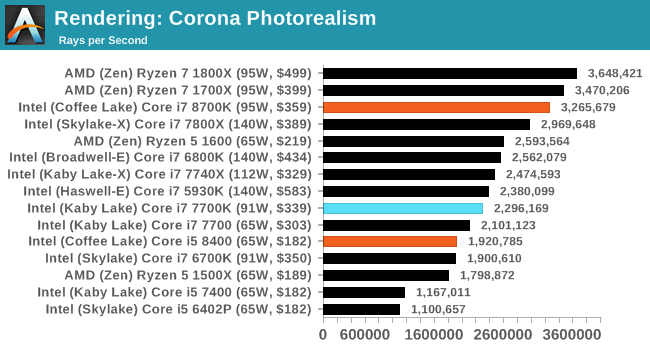
With more threads on display, the Core i7-8700K gets ahead of the previous mainstream Core i7 parts. The frequency difference over the Skylake-X processor gives an extra +10% performance, but the 16-thread parts from AMD win out overall.
Blender 2.78: link
For a render that has been around for what seems like ages, Blender is still a highly popular tool. We managed to wrap up a standard workload into the February 5 nightly build of Blender and measure the time it takes to render the first frame of the scene. Being one of the bigger open source tools out there, it means both AMD and Intel work actively to help improve the codebase, for better or for worse on their own/each other's microarchitecture.
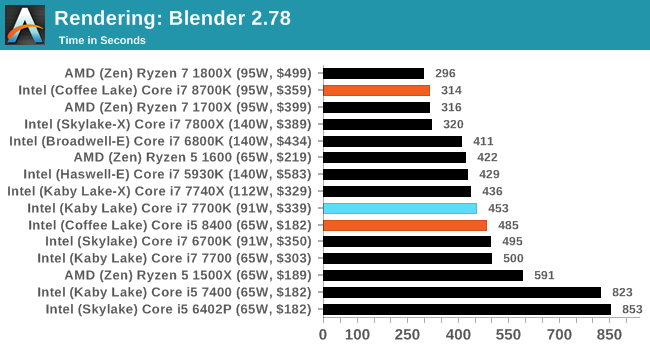
Blender seems to separate very nicely into core counts, with six cores from Intel matching eight cores from AMD.
LuxMark v3.1: Link
As a synthetic, LuxMark might come across as somewhat arbitrary as a renderer, given that it's mainly used to test GPUs, but it does offer both an OpenCL and a standard C++ mode. In this instance, aside from seeing the comparison in each coding mode for cores and IPC, we also get to see the difference in performance moving from a C++ based code-stack to an OpenCL one with a CPU as the main host.
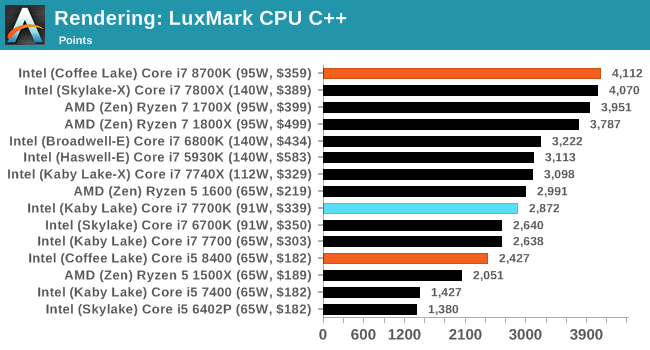
POV-Ray 3.7.1b4: link
Another regular benchmark in most suites, POV-Ray is another ray-tracer but has been around for many years. It just so happens that during the run up to AMD's Ryzen launch, the code base started to get active again with developers making changes to the code and pushing out updates. Our version and benchmarking started just before that was happening, but given time we will see where the POV-Ray code ends up and adjust in due course.
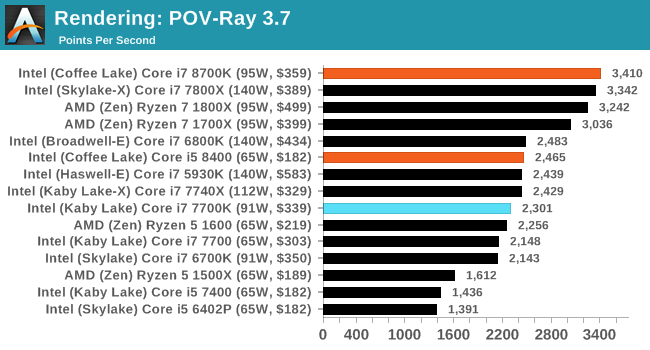
Cinebench R15: link
The latest version of CineBench has also become one of those 'used everywhere' benchmarks, particularly as an indicator of single thread performance. High IPC and high frequency gives performance in ST, whereas having good scaling and many cores is where the MT test wins out.
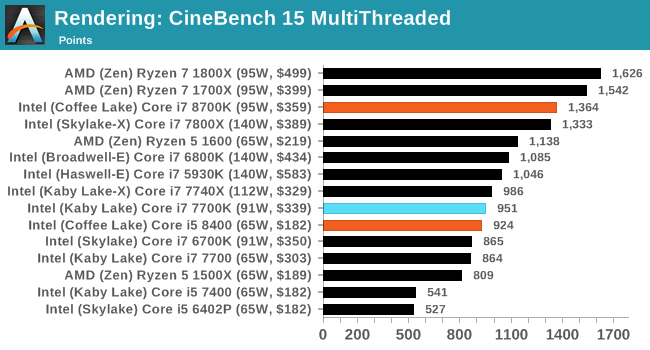
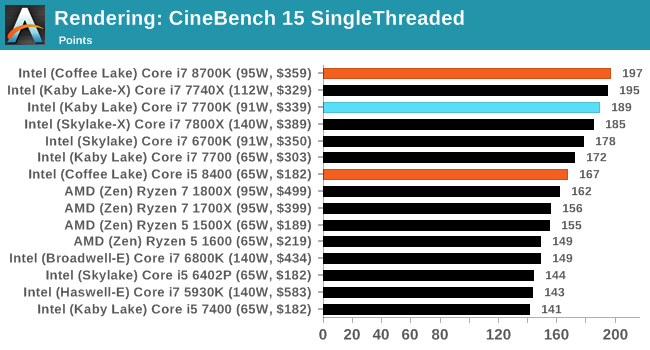
CineBench R15 in single thread mode can take the Core i7-8700K by the horns and drag it to be the best performing chip ever tested.










222 Comments
View All Comments
Zingam - Saturday, October 7, 2017 - link
Not everybody has a rich daddy! Performance per dollar matters in all areas of life!It doesn't matter to very, very rich people or sucker fanboys!
mapesdhs - Monday, October 9, 2017 - link
Again the myth that rich people don't care about wasting money. So wrong. :D As for fanboyism, that kind of label gets hurled in both directions, but IRL has little meaning.Gothmoth - Thursday, October 5, 2017 - link
an overlcocked ryzen 1700 is bit for bit the best choice.. still.except for hardcore gamers.
and i bet intel paid you quite a bit to ignore stuff other (less intel biased) reviewers pointed out today.
mkaibear - Thursday, October 5, 2017 - link
Ryzen has no integrated GPU so it can't be the best choice for anyone without a discrete GPU (aka the vast majority of the market - about 70% as per q1 2017). Ironically the gamers are the ones more likely to snap up Ryzen as they have discrete graphics cards anyway...Ananke - Thursday, October 5, 2017 - link
I see the same, ryzen 1700 remains the best buy, followed by ryzen 1600, which recent batches seems to have 8 cores instead of 6, for around $170. They do come with heatsink, another $30 saved. With ok board it will total $250. Even better, readily built Dell gaming desktops can achieve around $800 with r580 8gb and 16 GB ram with 1700 ryzen vs above $1100 for similar Intel. It is literally no brainer choiceGastec - Saturday, October 14, 2017 - link
Wow there, rewind! "Ryzen 1600, which recent batches seems to have 8 cores instead of 6". Care to explain more?Ryan Smith - Thursday, October 5, 2017 - link
"and i bet intel paid you quite a bit to ignore stuff other (less intel biased) reviewers pointed out today."You'd lose that bet.
Now since we're apparently doing this Jeopardy style, please tell me how much you wagered so that I know how much I'm collecting. Since Intel isn't paying me, you will have to do. ;-)
In all seriousness though, taking sides and taking bribes would be a terrible way to run a business. Trust is everything, so losing the trust of you guys (the readers) would be about the worst possible thing we could do.
FourEyedGeek - Saturday, October 7, 2017 - link
Are you happy for an overclocked Ryzen 1700 to be compared against overclocked Intel processors as well?gnufied - Thursday, October 5, 2017 - link
Your bench pages are either loading very slowly or displaying Gateway timeout.Ryan Smith - Thursday, October 5, 2017 - link
Thanks. Having the server team look into it.